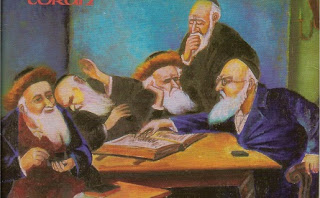- Home
- Krav Maga Blog
- Krav Instructors
- Train in Israel
- Tour Train Israel
- Krav Shop
- DVD
- Kickboxing
- IKI Near Me
- Seminars
- IKI Membership
- On-Line Training
- Krav Maga Training
- Testimonials
- History Krav Maga
- Instructors Page
- Past Blogs
- Spanish
- Italian
- Certification
- Contact
- Holland Seminar
- Vienna Seminar
- Poland Seminar
- Italy Seminar
- Belt Requirements
Legalism, Clarity
By Moshe Katz
October 1, 2018, Israel

Talmudic scholars debating a point of law, clarity.
Studying the Talmud one is easily baffled by the intense legalism; Statement, counter statement, attack and so forth. The process can cover several long pages in medieval Hebrew and Aramaic with a mixture of Greek. Add to that the endless commentaries, arguments and disputations and you begin to understand why it is one of the most complex fields of study. This also explains why Jews have a reputation as being good lawyers, the Talmud is the basis. From the youngest age we develop a legalistic mind and a complex way of thinking. We call this Talmudic Thinking.
The student might easily find this all frustrating and petty. Why the endless arguments over the minutia of the law? Why is every nuance worthy of study?
I am currently studying the tractate Gittin, which centers on the laws of divorce, a topic completely irrelevant to my life. (one cannot get divorced unless one is first married). I am not a lawyer, or a judge and never intend to be one. We study as part of our faith but there are endless practical lessons to be gleaned from this study. Tonight one popped into my head.
The discussion was regarding the wording a man uses to give a messenger the order to process a writ of divorce for his wife; the ancient rabbis analyze every word; does "write" imply to deliver the writ of divorce? Or perhaps he just wanted to have the document ready for another date? Was his intention to divorce his wife via a messenger, or was he just preparing a document? Does "write" include sign, witness and process?
And then it hit me; Clarity. That is what it is all about, clarity. The rabbis are trying to establish the wording and its meaning in a way that leaves no doubt, no ambiguity, no confusion.
Lawyers are necessary because they help us avoid conflict; when all is written down clearly and the terms of the agreement are made crystal clear, there will be less conflict. In order to avoid confusion we need to lay our cards on the table and be open. As we say "no hidden cards".
I learned this the difficult way. When I worked with the colleges and was trying to book Krav Maga seminars I would receive enthusiastic replies such as, "We are totally excited". "The students are really looking forward to this", or, "Awesome, we are stoked!".
And then just shortly before the seminar, when I was trying to finalize the details, I would hear something like, "So terribly sorry, we could not make it happen this time, hope there has been no inconvenience".
I learned my lesson and became more particular about words. I would write, "forgive me for being so petty but please respond in the following way: we are booked, we are confirmed, the event is set is stone and will take place" etc. Once I made that change my life improved. I had clarity.
Admittedly that was a problem particular to the students on college campuses but yet it was a valuable lesson for me. One must be clear with words. And thus I understand why the rabbis of the Talmud, so many years ago, analyzed and questioned each and every word. Did these words mean the woman is divorced and is free to date other men? If the man disappeared and cannot be found, is this woman free to go or is she still bound by the marriage? Who inherits the estate? The stakes are high over here, we need to be clear with our words.
There is another lesson here; if we are not sure about what words mean, we must ask for clarification. Different people use words in different ways. Lawyers must use certain legal terms but the rest of us may use words and have a different intended meaning. The reader must clarify what is meant.
Song writers are often approached about the meaning of their songs, but why? They are written in plain English? It is because "sometimes words have two meanings". (Led Zeppelin)
The legendary Bob Dylan was once asked for the meaning of a certain song, he responded, "I have given you my music, do you want me to explain it as well?"
While songs have poetic license and are open to interpretation, legal agreements must be clear, without "two meanings". A song, a work of art, can mean different things to different people but a legal document, a contract between two men, must have only one meaning. The Talmud was not wasting time, it was clarifying the intent and the meaning contained in the words.
Visit our other site
Israeli Krav International.com